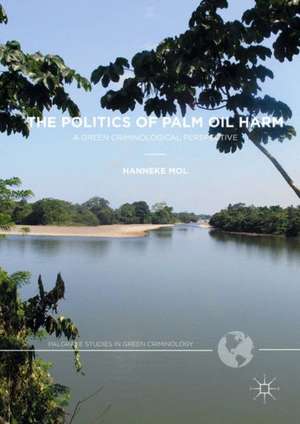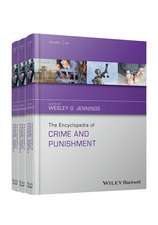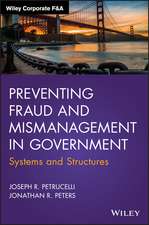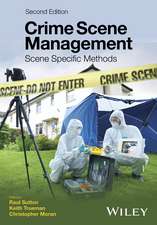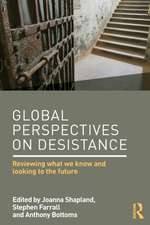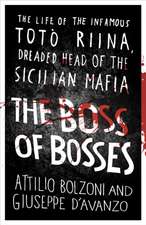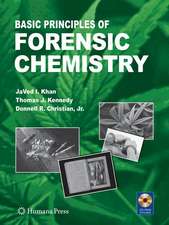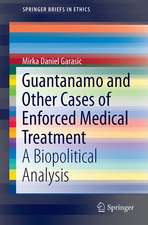The Politics of Palm Oil Harm: A Green Criminological Perspective: Palgrave Studies in Green Criminology
Autor Hanneke Molen Limba Engleză Hardback – sep 2017
| Toate formatele și edițiile | Preț | Express |
|---|---|---|
| Paperback (1) | 636.63 lei 6-8 săpt. | |
| Springer International Publishing – 13 mai 2018 | 636.63 lei 6-8 săpt. | |
| Hardback (1) | 645.96 lei 6-8 săpt. | |
| Springer International Publishing – sep 2017 | 645.96 lei 6-8 săpt. |
Din seria Palgrave Studies in Green Criminology
-
 Preț: 319.35 lei
Preț: 319.35 lei -
 Preț: 386.22 lei
Preț: 386.22 lei - 15%
 Preț: 642.18 lei
Preț: 642.18 lei - 18%
 Preț: 782.42 lei
Preț: 782.42 lei - 18%
 Preț: 891.48 lei
Preț: 891.48 lei - 18%
 Preț: 948.79 lei
Preț: 948.79 lei -
 Preț: 451.26 lei
Preț: 451.26 lei - 15%
 Preț: 648.24 lei
Preț: 648.24 lei - 18%
 Preț: 894.79 lei
Preț: 894.79 lei - 18%
 Preț: 944.82 lei
Preț: 944.82 lei - 15%
 Preț: 577.72 lei
Preț: 577.72 lei - 15%
 Preț: 637.13 lei
Preț: 637.13 lei - 18%
 Preț: 888.49 lei
Preț: 888.49 lei - 18%
 Preț: 895.45 lei
Preț: 895.45 lei - 18%
 Preț: 724.00 lei
Preț: 724.00 lei - 18%
 Preț: 949.73 lei
Preț: 949.73 lei - 15%
 Preț: 696.82 lei
Preț: 696.82 lei -
 Preț: 382.75 lei
Preț: 382.75 lei - 18%
 Preț: 945.14 lei
Preț: 945.14 lei
Preț: 645.96 lei
Preț vechi: 759.96 lei
-15% Nou
Puncte Express: 969
Preț estimativ în valută:
123.62€ • 128.58$ • 102.06£
123.62€ • 128.58$ • 102.06£
Carte tipărită la comandă
Livrare economică 15-29 aprilie
Preluare comenzi: 021 569.72.76
Specificații
ISBN-13: 9783319553771
ISBN-10: 3319553771
Pagini: 249
Ilustrații: XI, 245 p. 7 illus. in color.
Dimensiuni: 148 x 210 mm
Greutate: 0.57 kg
Ediția:1st ed. 2017
Editura: Springer International Publishing
Colecția Palgrave Macmillan
Seria Palgrave Studies in Green Criminology
Locul publicării:Cham, Switzerland
ISBN-10: 3319553771
Pagini: 249
Ilustrații: XI, 245 p. 7 illus. in color.
Dimensiuni: 148 x 210 mm
Greutate: 0.57 kg
Ediția:1st ed. 2017
Editura: Springer International Publishing
Colecția Palgrave Macmillan
Seria Palgrave Studies in Green Criminology
Locul publicării:Cham, Switzerland
Cuprins
1. Introduction.- 2. The Play of Power in the Politics of Harm.- 3. Palm Oil in Colombia: National and Local Context.- 4. Colombia’s Contested Grounds.- 5. Preparing the Ground: Discourses, Mechanisms, and Impacts.- 6. Reaping the Fruits.- 7. Conclusion: to Miss the Forest for the Trees?.- Annex: List of Interviews and Site Visits.
Recenzii
“This book is essential reading for any understanding of one of the biggest challenges to the world’s ecological sustainability. … this book remains a critical and central basis for understanding palm oil, from its globalized power to its local harms.” (Mark Ungar, Criminal Law and Criminal Justice, July, 2019)
Notă biografică
Hanneke Mol is a Research Fellow in Environmental Justice at Northumbria University, Newcastle upon Tyne, UK. She is co-editor of the books: Environmental Crime in Latin America: The Theft of Nature and the Poisoning of the Land (Palgrave, 2017) and Introducción a la Criminología Verde: Conceptos para nuevos horizontes y diálogos socioambientales (Fondo Editorial de la Universidad Antonio Nariño, 2017).
Textul de pe ultima copertă
This book examines the politics of harm in the context of palm oil production in Colombia, with a primary focus on the Pacific coast region. Globally, the palm oil industry is associated with practices that fit the most conventional definitions and perceptions of crime, but also crucially, forms of social and environmental harm that do not fit strictly legalistic definitions and understandings of crime. Drawing on rich field-based data from the region, Mol contributes empirically to an awareness of the constructions, practices, and the lived and perceived realities of harm related to palm oil production. She advances criminological debate around ‘harm’ by putting forward a theoretical and analytical approach that redirects the debate from a central concern with the academic contestedness of harm within criminology, towards a focus on the ‘on-the-ground’ contestedness of palm oil-related harm in Colombia. Detailed analysis and arresting conclusions ensure this book will be of great interest to students and scholars in the fields of Green and Critical Criminology, Environmental Sociology, and International and Critical Development Studies.
Caracteristici
Provides a thorough and stimulating contribution to the critical analysis and theorization of harm Offers a unique, in-depth, ethnographic study of an environmental issue in South America Enhances criminological understanding of the power dynamics that draw and keep in place the boundaries between legal harm, tolerated illegal harm, and non-tolerated illegal harm Includes supplementary material: sn.pub/extras
